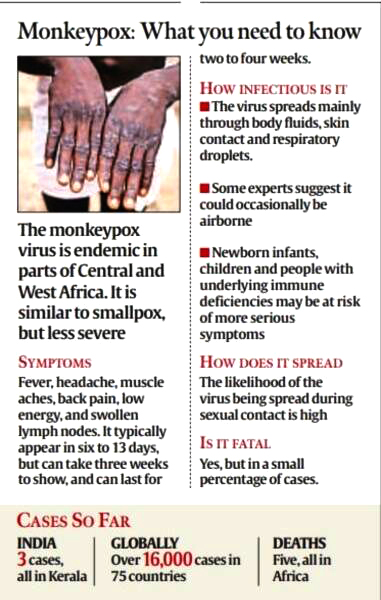Science & Technology
Monkeypox
- 25 Jul 2022
- 4 min read
For Prelims: Viral zoonosis, Monkey Pox, Small Pox
For Mains: Zoonotic Diseases, Health
Why in News?
Recently, the WHO (World Health Organisation) has Declared Global Health Emergency and sounded the highest alarm on the Monkeypox Virus.
- More than 16,000 cases of the virus - that was once largely confined to Africa - have been reported so far this year 2022.
What does Declaring an Emergency for Global Health Mean?
- About:
- Declaring a global emergency means the monkeypox outbreak is an “extraordinary event” that could spill over into more countries and requires a coordinated global response.
- Elements helped consider Health Emergency:
- The virus has spread to “non-endemic countries”. This virus has spread rapidly to many countries that have not seen it before.
- Three criteria for declaring a public health emergency of international concern have been met as per WHO.
- The three criteria for such a declaration are that it is an "Extraordinary Event," that it "Constitutes a Public Health Risk” to other States through the international spread of disease and that it "potentially requires a coordinated international response."
- The number - within a month - has grown five-fold.
- Scientific principles, evidence and other relevant information, are currently insufficient, leaving many unknowns.
- The risk to human health, international spread, and the potential for interference with international traffic.
- Previously Declared Emergency:
- WHO previously declared emergencies for public health crises such as the Covid-19 pandemic, the 2014 West African Ebola outbreak, the Zika virus in Latin America in 2016 and the ongoing effort to eradicate Polio.
- The emergency declaration mostly serves as a plea to draw more global resources and attention to an outbreak.
What is Monkeypox?
- About:
- Monkeypox is a viral zoonotic disease with symptoms similar to smallpox, although with less clinical severity.
- The infection was first discovered in 1958 following two outbreaks of a pox-like disease in colonies of monkeys kept for research — which led to the name ‘monkeypox’.
- Symptoms:
- Infected people break out in a rash that looks a lot like chicken pox. But the fever, malaise, and headache from Monkeypox are usually more severe than in chicken pox infection.
- In the early stage of the disease, Monkeypox can be distinguished from smallpox because the lymph gland gets enlarged.
- Transmission:
- Primary infection is through direct contact with the blood, bodily fluids, or cutaneous or mucosal lesions of an infected animal. Eating inadequately cooked meat of infected animals is also a risk factor.
- Human-to-human transmission can result from close contact with infected respiratory tract secretions, skin lesions of an infected person or objects recently contaminated by patient fluids or lesion materials.
- Transmission can also occur by inoculation or via the placenta (congenital monkeypox).
- Vulnerability:
- It spreads rapidly and can cause one out of ten deaths if infected.
- Treatment and Vaccine:
- There is no specific treatment or vaccine available for Monkeypox infection,
- But the European Union has recommended a Small Pox Vaccine, Imvanex to treat monkeypox after the WHO declared monkeypox a global health emergency.
- There is no specific treatment or vaccine available for Monkeypox infection,
UPSC Civil Services Examination, Previous Year Questions (PYQs)
Q. Critically examine the role of WHO in providing global health security during the Covid-19 pandemic. (2020)





